Male infertility is quite common today. According to statistics, among all married couples who want to have a child, conception is impossible in 45% of cases due to a man's illness. It can be caused by various diseases, for example, varicocele, decreased sperm motility, endocrine disorders, sexually transmitted infections, genetic abnormalities and environmental factors.
 Sometimes male infertility occurs due to intoxication of the body due to the abuse of alcohol, narcotic substances and smoking. It can also be caused by injuries to the testicles and groin area, injuries sustained during operations on the bladder, rectum and other pelvic organs. Before starting treatment for male infertility, it is necessary to undergo examinations by a specialist in order to identify the underlying cause and choose the optimal treatment plan.
Sometimes male infertility occurs due to intoxication of the body due to the abuse of alcohol, narcotic substances and smoking. It can also be caused by injuries to the testicles and groin area, injuries sustained during operations on the bladder, rectum and other pelvic organs. Before starting treatment for male infertility, it is necessary to undergo examinations by a specialist in order to identify the underlying cause and choose the optimal treatment plan.
Causes of male infertility:
1. Inflammatory processes.
Is one of the many causes that lead to infertility. The concentration of the inflammatory process in different organs can provoke the following diseases:
- prostatitis (inflammatory lesion of the prostate gland);
- vesiculitis (inflammation of seminal vesicles);
- colliculitis (inflammation that has arisen in the seminal tubercle);
- balanoposthitis (inflammation of the glans penis and foreskin);
- orchitis (testicular inflammation); epididymitis (an inflammatory process in the epididymis).
When the organs of the genitourinary system are inflamed, the biochemical properties of the seminal plasma are first disrupted. After all, it is known that the product of the seminal vesicles and prostate gland makes up more than 80% of the total volume of the ejaculate. Accordingly, spermatozoa will experience a lack of vital nutrients, which will inevitably lead to a decrease in their mobility, and instead of translational movement, agglutinates (lumps of spermatozoa) will form.
2. Varicocele.
Varicocele is a nodular enlargement of the veins of the spermatic cord. This disease occurs in 30% of men and in most cases leads to infertility.
Causes of varicocele:
- Genetic predisposition, expressed by weakness and insufficiency of the vascular wall of the testicle. This defect prevents blood flowing through the testicular vein from entering the main vessels, as a result, blood accumulates in the lobular plexus, which causes the veins to dilate.
- Increased blood pressure in the veins of the pelvis or scrotum. Such an anomaly leads to anatomical changes in the testicular vein, it can be compressed under the influence of other vessels, bend, which leads to an increase in blood pressure in it.
- Promote
3. Exogenous factors.
That is, factors that affect the human body from the outside. These include toxic effects of chemicals and medicines, temperature conditions, stress, bad habits, injuries, tumors, diseases, and more.
4. Genetic abnormalities.
In such cases, infertility is caused either by changes in the structure of DNA molecules, or by a violation of the structure or number of chromosomes.
Methods for diagnosing male infertility
The specialists of the EMC Urological Clinic use modern technologies for the diagnosis of male infertility. These include laboratory tests, ultrasound diagnostics, Doppler echography, and in some cases, endoscopic examination and MRI may be performed.
Male infertility treatment methods
In cases where an inflammatory process becomes the cause of infertility, the inflammation is eliminated first with medication or with the help of physiotherapy procedures. In most cases, after that, sexual function is restored on its own. With untimely treatment, infertility can become autoimmune, when the body produces antibodies to spermatozoa.
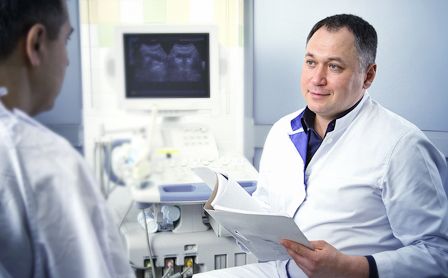 With varicocele, a comprehensive examination of the body is performed, which includes the determination of the hormonal profile of the blood, ultrasound and Doppler echographic examination of the testicular vessels with accurate measurement of the volume of the testicles. The difference in volume of more than 2 milliliters between the testicles indicates a violation of nutrition and degenerative processes in this organ. When comparing the results of the examination, there is often a need for surgical intervention. After surgery, prolonged stimulation of spermatogenesis is indicated — about 3 months. This leads to an improvement in the quality of sperm and increases the chances of fertilization of the egg.
With varicocele, a comprehensive examination of the body is performed, which includes the determination of the hormonal profile of the blood, ultrasound and Doppler echographic examination of the testicular vessels with accurate measurement of the volume of the testicles. The difference in volume of more than 2 milliliters between the testicles indicates a violation of nutrition and degenerative processes in this organ. When comparing the results of the examination, there is often a need for surgical intervention. After surgery, prolonged stimulation of spermatogenesis is indicated — about 3 months. This leads to an improvement in the quality of sperm and increases the chances of fertilization of the egg.
In the presence of exogenous factors, it is usually sufficient to eliminate the harmful effects, undergo a course of spermatogenesis stimulation, and the fertilizing ability of sperm is restored.
When identifying genetic disorders leading to infertility, modern medicine, resorting to molecular biological methods and methods of extracorporeal fertilization, allows you to select normal, without genetic defects, spermatozoa and makes it possible to have healthy children.
Thus, with a professional approach with a step-by-step and comprehensive examination, the problem of male infertility can be successfully solved in most cases. The effectiveness of male infertility treatment depends on an integrated approach to solving the problem. In many ways, the success of treatment depends on the professionalism of doctors, the correct diagnosis and the choice of the most appropriate and effective method.






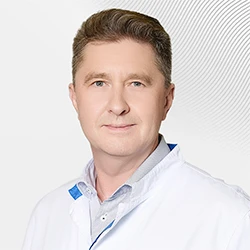
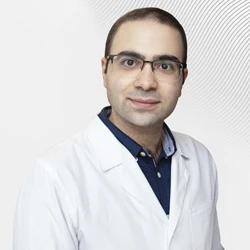
.webp)


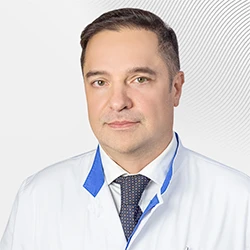


.webp)

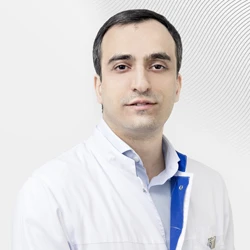
.webp)
